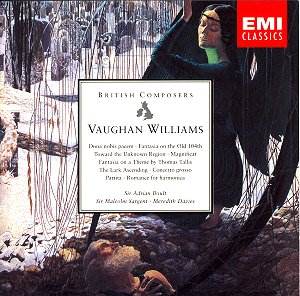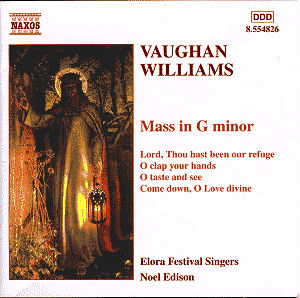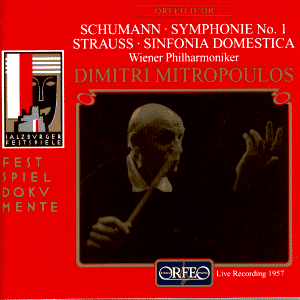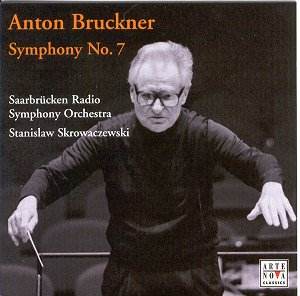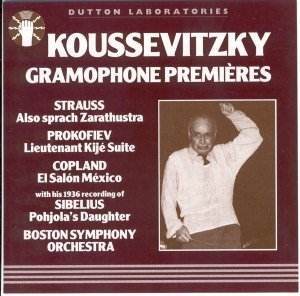 Composer: Serge Koussevitzky
Composer: Serge Koussevitzky
Works: El salón México (Aaron Copland), Lieutenant Kijé Suite (Sergei Prokofiev), Pohjola’s Daughter (Jean Sibelius), Also sprach Zarathustra (Richard Strauss)
Performers: Boston Symphony Orchestra
Recording: Symphony Hall, Boston, 1 Dec 1938 (Copland), 22 Dec 1937 (Prokofiev), 6 May 1936 (Sibelius), 22 Jan 1935 (Strauss)
Label: Dutton Laboratories
Serge Koussevitzky stands as a towering figure in the annals of 20th-century conducting, not merely for his tenure with the Boston Symphony Orchestra but for his role as a catalyst for American music. This compilation of historical recordings from the late 1930s offers a fascinating glimpse into Koussevitzky’s interpretative vision during a pivotal era in classical music history. The selected works, each significant in their own right, reveal the nuanced artistry Koussevitzky brought to both new and established repertoire, a reflection of his commitment to fostering a distinctly American sound while remaining rooted in European traditions.
The Copland’s El salón México, recorded just two years after its premiere, is rendered with a brashness that captures the exuberance of Mexican folk music through an American lens. Koussevitzky’s approach is markedly different from Leonard Bernstein’s later, more exuberant interpretations. Here, the Boston Symphony Orchestra plays with a careful precision that underscores Copland’s rhythmic vitality without compromising the work’s underlying lyricism. The woodwinds, particularly the flutes and clarinets, blend seamlessly, creating a vibrant tapestry of sound that evokes the bustling atmosphere of Mexico City. The engineering of this track, while mono, has a clarity that allows the rich colors of the orchestration to shine through, affirming Dutton’s commendable restoration efforts.
Prokofiev’s Lieutenant Kijé Suite benefits from Koussevitzky’s ability to balance fervor with finesse, encapsulating the sardonic humor that permeates the score. The briskness of the “Romance” and the energetic “Troika” showcase the orchestra’s technical prowess, with strings executing the rapid passages with remarkable cohesion. The rhythmic buoyancy of the “Kijé’s Wedding” is particularly striking, revealing Koussevitzky’s knack for maintaining a lively tempo without sacrificing the work’s structural integrity. The recording captures the orchestra’s vibrant brass and dynamic percussion, elements that could easily overwhelm in less adept hands.
Sibelius’s Pohjola’s Daughter unfolds with an exceptional dramatic arc under Koussevitzky’s direction. The performance reveals layers of emotional depth, with the conductor deftly navigating the score’s contrasting themes. The brass section’s powerful entries contrast beautifully with the delicate passages for strings and woodwinds, creating a compelling dialogue that reflects the mythological inspiration behind the piece. Koussevitzky’s interpretation emphasizes the work’s climactic moments while maintaining an underlying sense of lyricism, offering a well-rounded exploration of Sibelius’s sound world. The recording’s engineering captures the orchestra’s grandeur, making the most of the hall’s acoustics to deliver an immersive listening experience.
Richard Strauss’s Also sprach Zarathustra, while perhaps the most familiar of the selections, does not disappoint in Koussevitzky’s hands. The famous opening fanfare is delivered with a brisk tempo that imbues it with a sense of urgency and power, though at times, one might wish for a more expansive approach to allow the music’s full grandeur to unfold. The performance is technically proficient, but the interpretation may feel less inspired compared to the more revelatory readings found in modern renditions. Nonetheless, the orchestra’s precision and Koussevitzky’s command of dynamics ensure the piece resonates with its intended dramatic weight.
This collection, although not the definitive recording of any of the included works, serves as an invaluable document of Koussevitzky’s artistry and the Boston Symphony Orchestra’s capabilities during a golden age of American orchestral music. The historical context and the interpretative choices made by Koussevitzky speak to his enduring legacy as a conductor who championed new music while honoring tradition. Dutton Laboratories has succeeded in bringing these performances back to life, offering listeners not just a glimpse into the past, but an opportunity to appreciate the artistry that shaped American classical music for generations to come. The disc is a must-have for anyone interested in the evolution of orchestral performance and the rich tapestry of American music.
